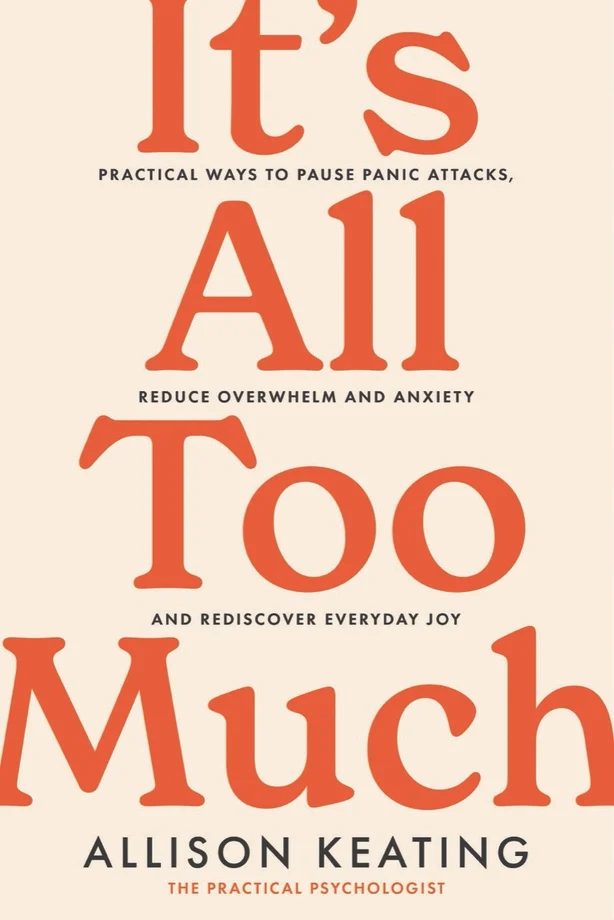Allison Keating is shortlisted for Bookstation Lifestyle Book of the Year in the An Post Irish Book Awards. You can vote at irishbookawards.ie. Below is an extract of It's All Too Much: Practical ways to pause panic attacks and overwhelm, reduce anxiety, and rediscover everyday joy.
Why is it all too much?
Imagine waking up every day feeling like the weight of the world is on your shoulders and your chest. And with such intensity that it takes your breath away, and not in a good way.
It is likely this won't require a great feat of imagination because this is the reality for so many of us in our fast-paced society. Our daily lives are a series of demands, often overlapping, all of which seem to require the same urgent attention. We are always going, always doing, always thinking, always tired and yet carrying on regardless and somehow, incredibly, it’s still never enough. Our bodies send SOS signals and yet it can be so hard to hear them amidst all the oncoming mental traffic. The effect of this is a constant sense of being close to the edge of overwhelm, coupled with a permanent sense that we’re fighting not to become completely overwhelmed. It’s like a tightrope walk over a precipice – if we make one wrong step, if we lose our focus for one second, we’ll plunge into the abyss and headlong into what feels like failure and a loss of self. It’s a never-ending balancing act that isn’t balanced. Some days, we feel we can never win, which takes a huge toll on us.
The question is: How long can we keep it up?
Why do I feel the way I do?
What makes this even harder is that we are often plagued by a sense that we should not feel this way, that there’s something wrong with us for having these thoughts and difficulties. We get angry at ourselves, wondering: Why do I feel the way I do?
That is something I hear very regularly in the therapy room. One client, Marie, summed it up when she railed at herself: 'I shouldn’t feel like this. This is so silly. Others have it so much worse than me. I have so much. I am so lucky.’ These are the pained words of dread, fear, anxiety and utter panic, coupled with a deep sense of isolation and disconnec- tion from herself and others. These are unforgiving words.
Why do you feel the way you do?
There are many reasons. Some are external, in your environment, and often not within your control. Some are internal, within your body and mind, embedded in your experiences and memories. Some parts you can work on and change; others need to be challenged and changed within society.
Over the course of 25 years working as a therapist, I’ve come to wonder: How are we not all anxious? It actually makes sense that we feel this way. But what has contributed to this state of anxiety that is the daily experience for so many people? One of the external causes sur- rounds us every minute of every day. Long before the word ‘pandemic’ became part of our daily lives there was an anxiety epidemic that spread through society, specifically First World society.
The First World anxiety epidemic
We are all familiar with the hashtag #firstworldproblems used self-dep- recatingly to highlight our over-privileged and trivial inconveniences, like responding with a frustrated eyeroll when the barista gives you an oat milk flat white when you asked for a coconut milk latte. There are ‘real’ problems in the world and yours isn’t one of them.
And so it begins, the internal and external conflict to distinguish between the ‘real’ problems and our perceived ‘silly’ ones, what we are allowed to feel and think and what we are not allowed to feel and think. Yes, there are real and serious problems everywhere, but negatively com- paring yours to others’ won’t change your experiences with anxiety or overwhelm. The #fwp narrative is like an antibiotic in that it kills the bad bacteria along with the good. It leads us to chronically ignore and blank out the direct messages coming from our minds and bodies that our lives and how we have been living them is not working for us.
In fact, we have a very real problem with large populations of adults, adolescents and children feeling overwrought and overwhelmed, the consequences of which are worthy of our full attention. As a psychologist, I come at this from the individual’s experience of how all your external and internal experiences have shaped you and brought you to where you are today.
And so, my first question to you is: ‘How are you feeling?’ Then: ‘How is your day-to-day life?’
Think about yourself as you are today. Everyone can see the outer you, your public persona. But the private inner you, including that inner child, holds so many formative experiences from your relationships with your siblings, parents, partners, friends and co-workers, all of which have left imprints that affect how you view the world and how you view yourself, as explored in my book The Secret Lives of Adults. How do you show up in all these relationships? Is it safe for you to be yourself? Or is part of the painful Why do I feel the way I do? linked to you not being able to authentically be yourself? Those accusations of ‘silly’ or ‘ridiculous’ or ‘lucky’ are the result of feelings that are suppressed and hidden, pushed deep down not only in your mind but also in your body. That creates a big problem for you. (Thankfully, as we will learn, there are solutions for that problem.)
I am interested in the relationship between the external world you occupy and your inner world because when these two collide, it can lead to huge friction and frustration. This is only made worse if you feel unable to allow yourself to feel what you are feeling and think what you are thinking. Along with ‘overwhelmed’, I hear the word ‘guilt’ every single day. I feel so guilty even saying this. How can anything change when you feel guilty or scared of how others will feel if you ‘change’? Do you know who you’d like to be, but struggle to even allow yourself to be your authentic self? Let me tell you, you are far from alone.
From my perspective as a psychologist, I dislike, disagree with, and avoid the narrative that tries to tell you that you aren’t coping well enough or you shouldn’t let that bother you or you aren’t resilient enough. That is a weaponisation of wellness and of resilience that pits you against yourself, and I have to say it makes my blood boil because it is making people sick as they push past their physical, emotional and mental limits. I feel it individualises a societal issue – and that means you end up getting the blame and society doesn’t need to do anything to change. In truth, what I hear about people’s private lives are often public issues. We need to challenge the status quo and not buy into it anymore.

If you have been affected by issues raised in this story, please visit: www.rte.ie/helplines.



